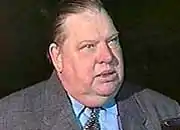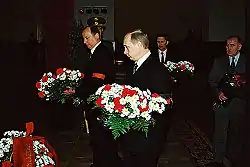
German Alexeyevich Ugryumov (Russian: Герман Алексеевич Угрюмов; 10 October 1948, Astrakhan, Soviet Union – 31 May 2001, Khankala, Chechnya, Russia) was a Soviet and Russian navy and security services official. During his childhood he lived in Chelyabinsk Oblast.[1]
Naval counterintelligence career
Ugryumov graduated in 1972 from the Caspian Navy Higher School in Baku, and in 1975 he joined the KGB. In 1976, he graduated from the Counterintelligence Higher School in Novosibirsk.[2][3] He worked for the Caspian Fleet counterintelligence unit in Baku until 1992, and worked in Azerbaijan during the Black January of 1990.[2] From 1992 to 1993 he led the Black Sea Fleet counterintelligence unit in Novorossiysk.
In 1993, he became the chief of Pacific Fleet FSB counterintelligence.[1] While in this post, he initiated the prosecution of journalist Captain Grigory Pasko on charges of the collection and storage of allegedly classified documents of the Pacific Fleet, as well as their transfer to the Japanese NHK TV company and Asahi Shimbun newspaper. Pasko was arrested in Vladivostok on 20 November 1997, as soon as he had returned from a trip to Japan. Pasko insisted that he had only transferred public documents on ecology and that the case had been fabricated by the FSB. He was found not guilty by a court in 2000, but the decision was later overturned, and on 25 December 2001 Pasko was sentenced to four years imprisonment.[4][5] Ugryumov had already died by the time of Pasko's sentence.
Second Chechen War
In 1998, the new FSB Director, Vladimir Putin, promoted Ugryumov to deputy chief of the Military Counterintelligence Directorate of the FSB for the Navy.[2][6] In 1999, he was appointed first deputy chief of the FSB Department for Protection of the Constitutional System and the Fight against Terrorism. From November 1999 until his death he led the department and supervised the FSB Special-Purpose Center that included the Alpha Group and Vympel spetsnaz units.[7][8] Ugryumov masterminded the arrest of Chechen warlord Salman Raduev in March 2000. In September 2000, Ugryumov and Deputy Interior Minister Vladimir Kozlov managed the resolution of a hostage crisis in Lazarevskoye near Sochi.[9] On 20 December 2000 President Putin awarded Ugryumov the Hero of Russia title for his leadership of a series of special operations conducted during the Second Chechen War.[2][3]
On 21 January 2001 Putin transferred the supervision of military operations in Chechnya from the Interior Ministry and military to the FSB, and placed Ugryumov in charge of the "liquidation of the leaders of terrorist groups" as head of the regional counter-terrorist staff.[10][11] According to the St Petersburg Times, this was the first time in the history of Russia that the security services had been given control of a military operation.[12] In spring 2001, Ugryumov was promoted from rear admiral to admiral.[7]
Death and legacy

Ugryumov died on 31 May 2001 in Khankala, the main Russian military base in Chechnya. According to the official version, he died of acute heart failure. However, according to Grigory Pasko, Ugryumov's death was probably a murder,[13] and some undisclosed FSB sources informed Alexander Korzhakov's "Stringer" website that Ugryumov had shot himself.[14]
On 5 September 2001 the Yakhont/Sonya class minesweeper BT 244 of the Russian Caspian Fleet was renamed in his honor.[15] Vyacheslav Morozov, a friend and colleague of Ugryumov, subsequently published a biography of Ugryumov entitled The FSB Admiral.[16]
On 9 December 2002 Novaya Gazeta published an open letter from Yusuf Krymshamkhalov and Timur Batchaev, Karachai suspects in the 1999 apartment blocks bombings in Moscow and Volgodonsk, to the commission for investigation of this event. In the letter, they claimed that Ugryumov had supervised the bombing campaign on behalf of the FSB,[17] and included an interview with one of main proponents of this theory, historian Yury Felshtinsky. Felshtinsky had passed the letter to the newspaper, and alleged that Ugryumov had committed suicide, possibly under pressure from the FSB.[18][19]
Ugryumov also allegedly provided cover (krysha) for Arbi Barayev, who was killed soon after his death.[20][21]
See also
References
- 1 2 (in Russian) Герой России Угрюмов Герман Алексеевич
- 1 2 3 4 (in Russian) АДМИРАЛ ФСБ Archived 2007-05-17 at the Wayback Machine
- 1 2 (in Russian)[http://www.whoiswho.ru/russian/Curnom/42001/konchin.htm Archived 2007-09-27 at the Wayback Machine КАДРОВАЯ ПАНОРАМА
- ↑ Johnson's Russia List #2078 25 February 1998
- ↑ (in Russian)Показания военного журналиста Пасько Г.М. по так называемой шпионской деятельности Archived 2007-02-10 at the Wayback Machine
- ↑ "Spy generals". Archived from the original on 2007-10-13. Retrieved 2007-02-20.
- 1 2 (in Russian)Адмирал ФСБ Документальный роман
- ↑ Johnson's Russia List #5054 27 January 2001 Archived 14 February 2007 at the Wayback Machine
- ↑ (in Russian)Борьба с терроризмом: до и после Беслана
- ↑ Putin's new plan for Chechnya: a return to the modus operandi of Stalin and Beria?
- ↑ "Moscow offers deal in Borodin case; FSB takes over Chechen campaign". Archived from the original on 2007-06-07. Retrieved 2007-02-20.
- ↑ Covering Up the Mess
- ↑ (in Russian)Григорий Пасько: Путин на меня очень долго смотрел Archived 2007-09-30 at the Wayback Machine
- ↑ (in Russian)ГЕРМАН УГРЮМОВ ЗАСТРЕЛИЛСЯ, А КОМАНДУЮЩИЙ ОГВ В ЧЕЧНЕ ВАЛЕРИЙ БАРАНОВ ДАЕТ ПОКАЗАНИЯ?
- ↑ (in Russian)
- ↑ (in Russian)
- ↑ (in Russian)ГЕКСОГЕНОВЫЙ СЛЕД Archived 2007-09-29 at the Wayback Machine
- ↑ (in Russian)Историк Юрий ФЕЛЬШТИНСКИЙ — о частном расследовании терактов в Москве, Волгодонске и Буйнакске Archived 2012-02-05 at the Wayback Machine
- ↑ Interview with Yuri Felshtinsky
- ↑ The Security Organs of the Russian Federation. A Brief History 1991–2004 by Jonathan Littell, Psan Publishing House 2006.
- ↑ The Background of Chechen Independence Movement VI: From the Dubrovka Theatre to "Black Widows"